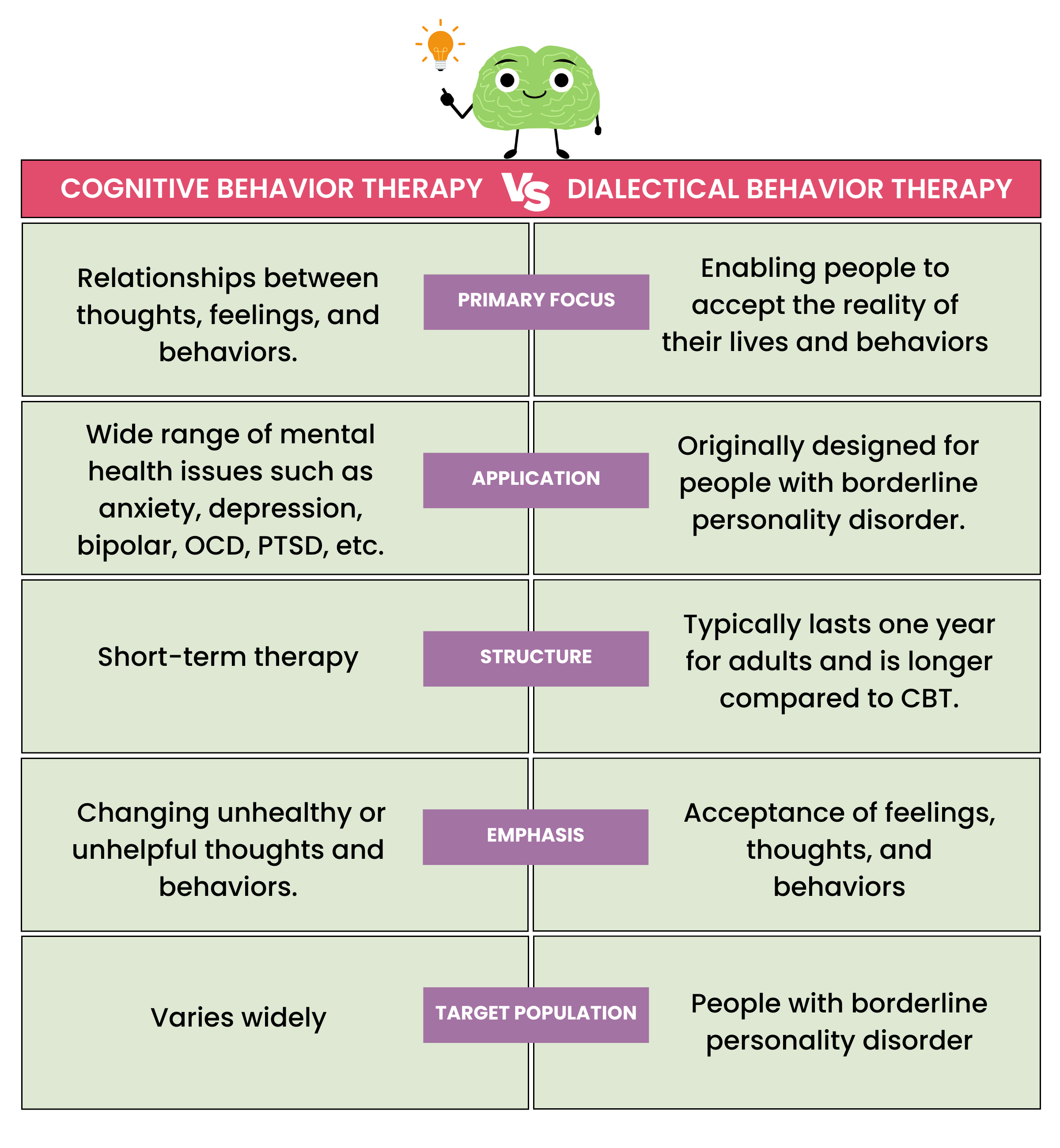Encouraging People Through Effective Dialectical Behavior Treatment (DBT) Solutions: Structure Stronger Mental Wellness Foundations
In the realm of psychological health and health, the importance of encouraging people via reliable Dialectical Behavior Treatment (DBT) services can not be overstated. By concentrating on the core principles of DBT, such as improving psychological regulation skills, improving social efficiency, building distress resistance strategies, and cultivating mindfulness methods, people can begin on a trip in the direction of building stronger mental health and wellness foundations. The influence of DBT exceeds simple symptom administration; it supplies an alternative technique that furnishes individuals with the devices required to navigate life's challenges with resilience and self-awareness. As we explore the transformative capacity of DBT in equipping individuals to lead even more fulfilling lives, the course to improved psychological wellness and well-being comes to be a compelling story that beckons exploration.
Understanding the Core Concepts of DBT


One core concept of DBT is recognition. Therapists using DBT acknowledge the patient's sensations and actions as legitimate reactions to their setting. This validation helps build a strong healing alliance and urges patients to work towards adjustment. An additional essential facet is dialectics, which teaches individuals to watch situations from several point of views and find the synthesis in between contradictory thoughts or emotions.
Furthermore, the concept of dialectical abstaining is main to DBT. This principle encourages individuals to abstain from suicidal actions while also approving themselves. By understanding and incorporating these core concepts, therapists can successfully implement DBT methods and support individuals in their journey towards psychological law and psychological wellness.
Enhancing Emotional Regulation Skills
Creating effectiveness in managing feelings is an essential aspect of fostering mental well-being and interpersonal efficiency - DBT London. Enhancing psychological law abilities is a core element of Dialectical Practices Treatment (DBT) that gears up people with the tools to navigate intense feelings in a healthy and constructive manner. Via DBT, individuals learn to recognize, recognize, and manage their feelings, leading to boosted mental health end results
DBT stresses the importance of mindfulness, which entails existing in the moment without judgment. This method allows people to observe their feelings without ending up being bewildered by them, boosting their capacity to react effectively instead than react impulsively. By cultivating mindfulness, individuals can establish a higher sense of self-awareness and psychological control.
Additionally, DBT instructs functional skills such as distress tolerance and feeling guideline methods to assist people manage tough emotions. By discovering these skills, individuals can decrease spontaneous habits, improve decision-making, and enhance their partnerships with others. Inevitably, boosting psychological law skills through DBT empowers people to lead even more meeting and well balanced lives.
.jpg)
Improving Interpersonal Performance
Having established a strong foundation in psychological guideline abilities within the framework of Dialectical Practices Therapy (DBT), the emphasis now moves towards improving interpersonal efficiency. Improving interpersonal effectiveness is a critical element of DBT as it equips people with the required abilities to browse social interactions, connect successfully, established limits, and develop healthier connections.
In DBT, social efficiency resource skills are educated with modules that focus on areas such as assertiveness, reliable communication, and interpersonal problem-solving. By discovering these skills, people can enhance their ability to reveal their needs and desires, preserve self-respect, and construct more powerful links with others.
Practicing mindfulness is an important part of improving social efficiency within the DBT structure. Mindfulness permits individuals to be existing in their interactions, listen proactively, and respond attentively rather than react impulsively. By including mindfulness right into their every day lives, individuals can cultivate greater self-awareness and emotional regulation, which are vital for effective interpersonal communications.
Structure Distress Tolerance Techniques
Discovering effective methods for handling psychological distress is vital for individuals seeking to boost their coping abilities and strength. Building distress resistance methods is a critical facet of Dialectical Practices Treatment (DBT) that equips people to browse challenging feelings without becoming overwhelmed.
In addition, mindfulness techniques play a substantial function in structure distress resistance. Mindfulness encourages individuals to stay existing in the moment without judgment, permitting them to observe their ideas and feelings without reacting impulsively. This awareness enables people to endure distress better and establish a greater sense of control over their reactions.
In enhancement to these techniques, producing a tailored distress resistance strategy with the guidance of a trained therapist can provide people with a customized approach to taking care of psychological distress - DBT London. By incorporating these approaches right into every day life, people can strengthen their mental health structures and boost their overall well-being

Cultivating Mindfulness Practices
To grow their distress tolerance techniques further, individuals can focus on cultivating mindfulness techniques as a complementary strategy within the structure of Dialectical Practices Therapy (DBT) Mindfulness, a crucial element of DBT, includes paying attention to today minute without judgment. By fostering mindfulness, individuals can boost their understanding of ideas, feelings, and bodily feelings, advertising a deeper understanding of themselves and their experiences.
Mindfulness techniques in DBT include methods such as conscious breathing, body scans, and observing ideas without add-on. These practices urge people to create a non-reactive stance towards their inner experiences, permitting them to react to tough scenarios with better clarity and composure. By including mindfulness into everyday regimens, people can discover to manage their feelings extra properly, minimize spontaneous behaviors, and cultivate a sense of inner tranquility.
Through growing mindfulness practices, people going through DBT can build a strong foundation for managing stress and anxiety, boosting partnerships, and enhancing overall health. By integrating mindfulness right into their therapeutic trip, individuals can develop useful abilities that equip them to navigate life's challenges with resilience and self-awareness.
Final Thought
To conclude, reliable Dialectical Behavior Therapy (DBT) services play a crucial role in equipping individuals to construct more powerful mental health structures. By understanding the core concepts of DBT, boosting emotional policy skills, enhancing social effectiveness, developing distress tolerance strategies, and growing mindfulness practices, people are geared up with the essential tools to browse their feelings, partnerships, and difficulties in a much more resistant and flexible fashion. DBT services offer a thorough click approach to advertising mental health and encouraging people to lead fulfilling lives.
By concentrating on the core principles of DBT, such as improving psychological regulation abilities, boosting social effectiveness, constructing distress tolerance techniques, and cultivating mindfulness practices, individuals can begin on a journey towards building more powerful mental wellness he said structures. Enhancing emotional policy skills is a core element of Dialectical Practices Treatment (DBT) that outfits people with the tools to browse extreme feelings in a healthy and constructive manner.Additionally, DBT shows functional skills such as distress tolerance and emotion policy methods to help people handle difficult emotions.To deepen their distress resistance techniques even more, people can concentrate on growing mindfulness techniques as a complementary approach within the framework of Dialectical Practices Treatment (DBT) By recognizing the core concepts of DBT, improving emotional policy skills, enhancing social effectiveness, building distress tolerance methods, and cultivating mindfulness methods, people are equipped with the necessary devices to navigate their feelings, relationships, and obstacles in an extra adaptive and durable way.